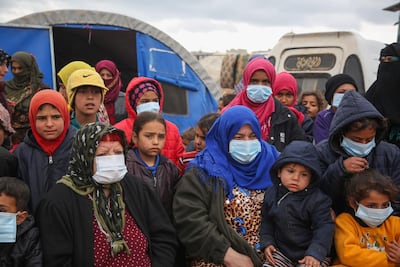All of us have had our lives upended by the coronavirus outbreak. Schools have shut down, airplanes have been grounded all over the world, doctors and nurses are working round the clock to save lives and the rest of us who aren’t absolutely essential to the day-to-day functioning of food and supply lines have to stay home. We are practicing social distancing in an effort to limit the spread of the virus, washing our hands regularly and sanitising everything.
It can all seem onerous, but many of us are quite lucky when you think about it. We have access to potable water and soap, we can shower, we aren’t worried about the food running out from the supermarkets or the medicine from the pharmacies. Many of us have roofs over our heads.
There are many who don’t.
Today, there are more than 70 million people displaced worldwide, according to the UN High Commissioner for Refugees. That includes internally displaced people, or IDPs, who have fled war inside their own country and refugees who crossed borders in search of shelter. Most of the refugees are from Syria, followed by Afghanistan and South Sudan. Around 37,000 people a day are forced to flee their homes because of war and persecution. That is one person every two seconds.
Most of them are fleeing to neighbouring countries that are themselves struggling, leaving them vulnerable in places with poor or inadequate healthcare. Those who stay in their countries will fare even worse in areas devastated by conflict.

Let us take the case of Syria. Most of those displaced by the war are still inside the country – around 10 million people rendered homeless by fighting. A recent government offensive in Idlib province, near the Turkish border, forced a million civilians to flee to the frontier between the two countries, their children in tow.
Most are living in flimsy tents that flood every time it rains or under the open air, in large family groups. They have little access to life’s basic necessities, including running water. In a recent interview with the New York Times, one man in the province said he had to go for days without bathing his children, let alone wash his hands regularly, for lack of clean water.
Social distancing is a privilege. If the virus takes hold in those communities, it will be a catastrophe. Nor are there medical facilities capable of handling any outbreak. The Bashar Al Assad regime and its allies have conducted at least 537 separate attacks on healthcare facilities in the country, destroying the ability of communities to care for the sick.
In the meantime, reports have emerged of possible Covid-19 cases in government-controlled and impoverished areas of Syria – though, officially, the authorities have only acknowledged one case. The health minister there, when asked about the disease, said the military had “cleansed the country of germs”, referring to the opposition. It hardly inspires confidence, and the risk of an outbreak in a failed state with a ruined economy and healthcare system are even graver.
Those living in refugee camps further afield fare no better, such as in neighbouring Lebanon or in overcrowded neighborhoods of Gaza living under siege in a tiny strip of territory. The potential for an infection spreading like wildfire is extremely high and very deadly due to the absence of proper care.
Then there are the refugees who have to endure the racism of demagogues, both in the Middle East and abroad. The pandemic has already seen Donald Trump refer to coronavirus as the “Chinese virus” and imply that preventing migrants from entering the country would protect everyone from infection. In Europe, far-right politicians have spread conspiracy theories about refugees and migrants bringing the pandemic to Western shores – a racist accusation against the world’s most vulnerable. Some of those most vulnerable people live in notoriously awful conditions in refugee camps in Europe, such as the Moria camp in Greece, where, once again, the pandemic taking hold could be disastrous.
Protecting refugees, who have already lost everything, is paramount – not only because it would help curb the spread of the virus, but also because it is the decent thing to do. The public health emergency that the world is enduring at the moment will last for quite some time, and it depends upon everyone doing their part to “flatten the curve” – i.e. curb infection rates – and helping the most vulnerable in our societies.
Governments must take measures to provide health care and support for the most vulnerable among us and, in conflict zones, to establish ceasefires that allow aid and assistance to reach everybody in need. As individuals, we can perhaps provide for the more vulnerable closer to home, whether that is an elderly neighbour who cannot shop for groceries or a family whose parents have lost their jobs because of the pandemic. And, when social isolation frustrates us, we must remember we are lucky to have the facility to self-isolate in the first place.
The time is now to start building the societies that will emerge out of this pandemic. Perhaps, cooped up in isolation, we will grow kinder to others, no matter the colour of their skin or their mother tongue.
Kareem Shaheen is a former Middle East correspondent based in Canada











